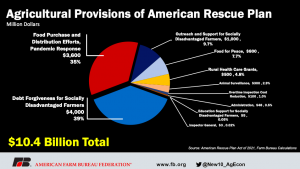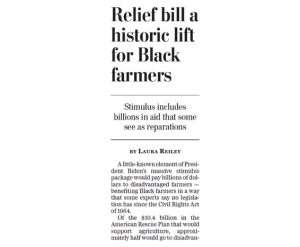Bloomberg's Mike Dorning reported on Wednesday that, "The Biden administration announced $12 billion in new farm aid, and said it will seek to expand Covid assistance to producers that weren’t…
American Rescue Plan and Agriculture, Measure Includes Billions in Aid for Disadvantaged Farmers
Laura Reiley reported on the front page of today’s Washington Post that, “A little-known element of President Biden’s massive stimulus relief package would pay billions of dollars to disadvantaged farmers — benefiting Black farmers in a way that some experts say no legislation has since the Civil Rights Act of 1964.
Of the $10.4 billion in the American Rescue Plan that will support agriculture, approximately half would go to disadvantaged farmers, according to estimates from the Farm Bureau, an industry organization. About a quarter of disadvantaged farmers are Black. The money would provide debt relief as well as grants, training, education and other forms of assistanceaimed at acquiring land.
“While it’s a fraction of the $1.9 trillion bill that passed in the Senate on Saturday, advocates say it still represents a step toward righting a wrong after a century of mistreatment of Black farmers by the government and others. Some say it is a form of reparations for African Americans who have suffered a long history of racial oppression.”

The Post article stated that, “Black farmers in America have lost more than 12 million acres of farmland over the past century, mostly since the 1950s, a result of what agricultural experts and advocates for Black farmers say is a combination of systemic racism, biased government policy, and social and business practices that have denied African Americans equitable access to markets.”
Ms. Reiley added that, “Of the 3.4 million farmers in the United States today, only 45,000 are Black, according to the USDA, down from 1 million a century ago. Black farmland ownership peaked in 1910 at 16 to 19 million acres, about 14 percent of total agricultural land, according to the Census of Agriculture. A century later, 90 percent of that land had been lost. White farmers now account for 98 percent of the acres, according to USDA data.”
Today’s article pointed out that, “This is not the first time the federal government has attempted to compensate Black farmers for decades of marginalization and systematic discrimination. Known as Pigford I and II, two class-action lawsuits against the USDA paid out $2.3 billion to Black farmers who alleged racial discrimination in the department’s allocation of farm loans and assistance beginning in 1983.”

DTN Ag Policy Editor Chris Clayton reported today that, “An agricultural debt-relief provision that amounts to two-tenths of 1% in spending out of the $1.9 trillion aid package in Congress is becoming one of the most controversial parts of the bill because it sets aside specific aid exclusively for minority farmers.
“Among the pieces for agricultural aid, the bill would provide payments of up to 120% of farm-loan indebtedness for USDA direct or guaranteed loans for farmers considered socially disadvantaged — defined as Black or African American, American Indians or Native Alaskans, Hispanics, Asians and Native Hawaiians or Pacific Islanders. The bill would allow USDA ‘such sums as may be necessary’ to pay off the loans. The extra 20% is built in to pay off expected tax debt from the loan.
“The Congressional Budget Office projects the loan forgiveness for socially disadvantaged farmers to cost about $4 billion.”
The American Rescue Plan will begin to right the long history of discrimination in agriculture, and I am proud to fight for justice for our Black farmers.
— David Scott (@repdavidscott) March 10, 2021
Mr. Clayton explained that, “The aid for socially disadvantaged farmers was written to address failures of the Black farmers’ case known as Pigford v. Glickman. While the second Pigford case was settled a decade ago, Black farm organizations cite there are still more than 17,000 legacy Black farmers being hit with garnished Social Security and tax refunds from delinquent USDA farm loans, some going back 30 years. Little of the Pigford settlement went to paying off those old loans.”
“Sen. Patrick Toomey, R-Pa., criticized the provision on the Senate floor and tried to have it removed. His amendment lost on a 50-49 vote before the Senate passed the full bill,” the DTN article said.
And Bloomberg’s Mike Dorning and Megan Boyanton reported Tuesday that, “That one of the Biden administration’s first legislative advances on racial equity is coming in agriculture — a policy area typically dominated by farm state politicians who often represent overwhelmingly White constituencies — shows how the political constellation on farm policy shifted this year.”
The Bloomberg article noted that, “The coronavirus relief measure provides $4 billion for debt relief for minority farmers. Another $1 billion is dedicated to assistance, including help addressing heirs’ property issues, grants to historically Black colleges and universities and funding for a racial equity commission to ‘root out’ discrimination at the USDA set up by Biden’s agriculture secretary, Tom Vilsack.”





